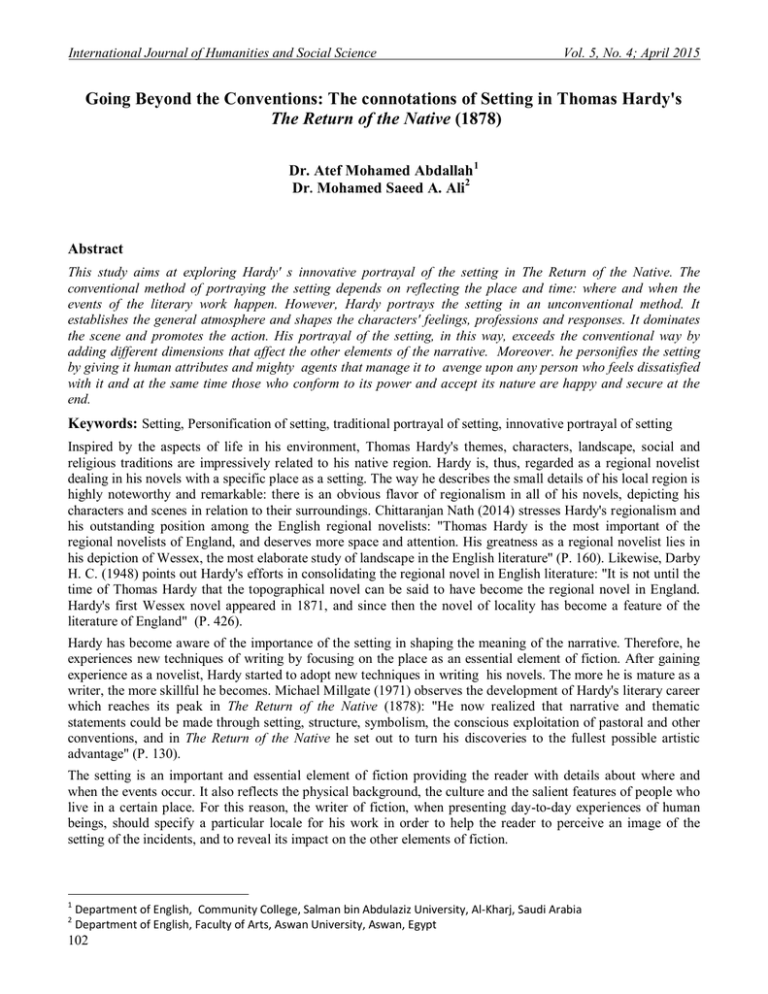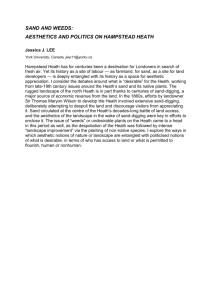Going Beyond the Conventions: The connotations of Setting in Thomas... The Return of the Native Dr. Atef Mohamed Abdallah
advertisement

International Journal of Humanities and Social Science Vol. 5, No. 4; April 2015 Going Beyond the Conventions: The connotations of Setting in Thomas Hardy's The Return of the Native (1878) Dr. Atef Mohamed Abdallah1 Dr. Mohamed Saeed A. Ali2 Abstract This study aims at exploring Hardy' s innovative portrayal of the setting in The Return of the Native. The conventional method of portraying the setting depends on reflecting the place and time: where and when the events of the literary work happen. However, Hardy portrays the setting in an unconventional method. It establishes the general atmosphere and shapes the characters' feelings, professions and responses. It dominates the scene and promotes the action. His portrayal of the setting, in this way, exceeds the conventional way by adding different dimensions that affect the other elements of the narrative. Moreover. he personifies the setting by giving it human attributes and mighty agents that manage it to avenge upon any person who feels dissatisfied with it and at the same time those who conform to its power and accept its nature are happy and secure at the end. Keywords: Setting, Personification of setting, traditional portrayal of setting, innovative portrayal of setting Inspired by the aspects of life in his environment, Thomas Hardy's themes, characters, landscape, social and religious traditions are impressively related to his native region. Hardy is, thus, regarded as a regional novelist dealing in his novels with a specific place as a setting. The way he describes the small details of his local region is highly noteworthy and remarkable: there is an obvious flavor of regionalism in all of his novels, depicting his characters and scenes in relation to their surroundings. Chittaranjan Nath (2014) stresses Hardy's regionalism and his outstanding position among the English regional novelists: "Thomas Hardy is the most important of the regional novelists of England, and deserves more space and attention. His greatness as a regional novelist lies in his depiction of Wessex, the most elaborate study of landscape in the English literature" (P. 160). Likewise, Darby H. C. (1948) points out Hardy's efforts in consolidating the regional novel in English literature: "It is not until the time of Thomas Hardy that the topographical novel can be said to have become the regional novel in England. Hardy's first Wessex novel appeared in 1871, and since then the novel of locality has become a feature of the literature of England" (P. 426). Hardy has become aware of the importance of the setting in shaping the meaning of the narrative. Therefore, he experiences new techniques of writing by focusing on the place as an essential element of fiction. After gaining experience as a novelist, Hardy started to adopt new techniques in writing his novels. The more he is mature as a writer, the more skillful he becomes. Michael Millgate (1971) observes the development of Hardy's literary career which reaches its peak in The Return of the Native (1878): "He now realized that narrative and thematic statements could be made through setting, structure, symbolism, the conscious exploitation of pastoral and other conventions, and in The Return of the Native he set out to turn his discoveries to the fullest possible artistic advantage" (P. 130). The setting is an important and essential element of fiction providing the reader with details about where and when the events occur. It also reflects the physical background, the culture and the salient features of people who live in a certain place. For this reason, the writer of fiction, when presenting day-to-day experiences of human beings, should specify a particular locale for his work in order to help the reader to perceive an image of the setting of the incidents, and to reveal its impact on the other elements of fiction. 1 2 Department of English, Community College, Salman bin Abdulaziz University, Al-Kharj, Saudi Arabia Department of English, Faculty of Arts, Aswan University, Aswan, Egypt 102 ISSN 2220-8488 (Print), 2221-0989 (Online) ©Center for Promoting Ideas, USA www.ijhssnet.com Eudora Welty (1957) stresses the significance of the setting as a vital and crucial element of fiction when she observes that "fiction depends for its life on place. Location is the crossroads of circumstance, the proving ground of what happened? Who's here? Who's coming' -and that is the heart's field" (P. 4). Hence, sticking to a definite place is significant since it makes the characters real and the depicted scenes reliable. Moreover, the novelist writes best about the places with which he is most familiar because his close contact with the location makes him aware of what is going on and how people of a specific area behave, act and react. To give his writing authenticity, the novelist cannot distance the characters in his literary creation from the specialty of their place. For if he does, his writing will seem less convincing or impressive. Welty (1957) also points out the difference between the kind of writing which is stimulated by a particular place and that which is not: "When we write a novel out of the saturation of place, we have more to draw on than we know, but when we write with no roots struck down, we will have to be exploiters snatching the first things that glitter on top, and trying to be the first ones there, too, or these will be gone" (PP. 23-24). Thus, the significance of the type of setting that is based on the novelist's intimate knowledge and close observation is confirmed. The frequent reference to a certain place in fiction is of great importance, particularly when the writer reflects it honestly and faithfully. Hardy, who is associated with a particular region, the life of which he consistently portrays in his novels, is one of the novelists whose literary contribution is mainly related to their native regions that represent the permanent reservoir to which they frequently resort for setting their literary works. Such novelists are linked in the minds of their readers with these places which they recurrently use as settings in their narratives. Such great writers include William Faulkner and John Steinbeck who frequently portray the regions where they were born and raised, in which they were closely acquainted with the various aspects of life, and which they depict in their novels. For example, Faulkner focuses on depicting Oxford, Mississippi, while Steinbeck portrays Salinas, California. The choice of a particular setting is the common thread that distinguishes the literary works of these writers. Although they deal with different themes, their common interest in depicting a specific place as a setting in their works gives them particularity and uniqueness. Hardy shares the same interest of focusing on depicting the native region as a setting with these great writers; transforming, thus, the real world into a fictional one. He gives a fictional name to this region; namely Wessex which is well-known all over the world, and which is based on the rural area where Hardy was born and raised up. He uses it as a setting for a great number of his novels, depicting the various aspects of life which he closely observes in this region, and reflecting its geographical details, culture, and socio-economic situation as well. The aim of this paper is to examine Hardy's unconventional portrayal of setting in his novel The Return of the Native (1878). The conventional method of portraying the setting depends on reflecting the place and time; where and when the events of the literary work happen. However, Hardy's portrayal of the setting exceeds the usual way by adding different dimensions that affect the other elements of the narrative and help to give a unique attribute to his treatment of setting. In Hardy's novels, setting is not merely a place where the events happen, rather it has a social and cultural significance and it reflects geographical details, culture, and socio-economic situation. Besides, it establishes the general atmosphere of the events, and it shapes the characters' feelings, professions and responses, dominating the scene and promoting the action. Like other Victorian novelists, who use local surroundings as settings in their novels, Hardy is distinguished by his notable and remarkable functioning of the place as an important factor in the narrative. Hardy's obvious distinction is in fact due to his keen observation and direct knowledge of his region. He observed people's behavior, folktales, superstition, dialects and the ways of living life. His immediate knowledge and familiarity with the rural environment and the landscape of his native region have endowed him with a distinctive position among the Victorian novelists. Peter Robson (2011) confirms Hardy's resourceful knowledge that discerns the portrayal of the local backdrop: " Hardy is distinguishable from his fellow writers both by the extent to which he drew on local folklore and, in particular, by his first-hand knowledge of the subject" (P. 26). More than that, Hardy's knowledge of his region is not limited to people and landscape. Rather, it extends to include the history, the dialect and the traditions of the place. Beside the literary value of his novels, they include valuable information about different aspects of life in this rural region. For example, the reader of his novels can know about the processes of industrialization and development that were remarkable features of life in the Victorian era. "What emerges in his novels. . . is an accurate account of rural life through all of the century’s developments, one which provides us with an alternative to academic cultural histories. 103 International Journal of Humanities and Social Science Vol. 5, No. 4; April 2015 Through the alternative form of his novels, we see the introduction of telegraph, railways and farm machinery to Wessex" (Rogers, 2001, PP. 228-229). Thus, his knowledge of all aspects of life in his region gives him credit as an authentic and reliable writer who has close association with his surroundings. Rogers adds: "it was certainly his familiarity and expertise in the history of the region that gained him a reputation as authority on its language and lore" (P. 227). Hardy's novels are based on his personal experiences, the observations of the landscape of his native region, the country folks with whom he has communicated since his childhood, the land that was rural and isolated from the modernized movement that was going on in all the other parts of the Victorian Britain. Consequently, he occupies a prominent and outstanding status among his comtemporaries and this is due to his keen observation and close contact with the subject of his writing. Harry Blamires (2003) stresses Hardy's immediate and close knowledge of his surroundings: "Hardy knows his Wessex countrymen like the back of his hand" (P. 319). Hardy's stature as a great figure in English literature is obviously associated with a number of novels that he located in the English County of Dorest which he has fictionalized into "Wessex". Thus, this place becomes the permanent source to which he frequently reverts to depict in his works. For this reason, Wessex has profound overtones in shaping the essence of his novels. He uses a combination of real and fictional names for the landscape features and the towns and the villages of Dorest. Hardy's overwhelming infatuation with his birth place motivates him to utilize this local environment to interweave his themes, the characters, and the events of his novels. Louis James (2006) comments: "Hardy found his true subject, the rural Dorset of his childhood" (P. 121). Hardy writes best when he deals with the various aspects of life in his birth place with which he has a close contact, immediate knowledge and strong bond. The setting in The Return of the Native is specifically significant and noteworthy of investigating its implications and associations because Hardy reveals a greater interest in and a more skillful treatment of his local material. After several attempts with portraying this region in his novels, he becomes more experienced and mature in depicting the setting in this novel, which represents the climax of his pictorial skill and provincial interest in depicting the rural surroundings. William A. Cohen (2006) adds that Hardy "returned to his native territory for the setting of this novel [The Return of the Native] with a new seriousness of aesthetic purpose and design" (P. 440). Similarly, Cristina Chifane (2012) notices the centrality of the setting in his writing: "the setting represents a vital element in all his literary pieces" (P. 58). Again, Harvey (2003) clarifies the strong association of setting with the real place that he distinctively knows by pointing out that this novel "is informed by childhood memories of landscape, nature, the isolated rural community, and also by the exploration of human relationships" (P. 26). Hardy limits the setting of his novel The Return of the Native to one locale; namely Egdon Heath. which does not only provide the location where the events take place but it also interacts with its inhabitants and shapes their lives and fates. More than that, it has a social and cultural significance as it establishes the general mood and shapes the characters' feelings and responses. Moreover, it enhances and promotes the action and reflects the salient features of life in the Victorian age. Duffin (1967) comments that The Return of the Native " is indeed the story of Egdon Heath. Egdon is not only the scene of the tale; it dominates the plot and determines the characters. It is sentient: it feels, it speaks, it slays" (P. 128). The opening chapter of the novel that is entitled: "A face on which Time makes but little impression" is dedicated to associate the novel with specific place that dominates over the other elements of fiction. It focuses on describing the setting and giving the minute details that help the readers to perceive the isolated nature and the salient characteristics of this place. Thus, Hardy is exceptional in dedicating the opening chapter to expose the main features of the setting and to reflect the uniqueness of this region. Therefore, no one of the characters appears except the place because his main concern is to give a detailed account of Egdon Heath. William A. Cohen (2006) points out Hardy's individuality and excellence in depicting Egdon Heath as "perhaps the most famous landscape description in British fiction" (P. 446). Moreover, on the level of his writing, Hardy's portrayal of Egdon Heath is exceptional and unique and consequently its depiction in this manner is of uttermost importance because of its significance as a setting and its dominance over the other elements of fiction."The new novel opened with a piece of scene setting and natural description far more ambitious than anything Hardy had previously attempted" (Millgate, 1971, P. 130). Hardy depicts Egdon Heath in a unique way and in an unconventional manner, because he reveals a distinguished ability in his attempt to personify Egdon, and in his portrayal of the setting as a living human figure that has all the features of a living human being. 104 ISSN 2220-8488 (Print), 2221-0989 (Online) ©Center for Promoting Ideas, USA www.ijhssnet.com In so-doing, Hardy delineates the setting differently, giving it personality and animation. Although Egdon Heath is inanimate object, Hardy gives it life and deals with it as an animate being. Since it is personified in this novel, Egdon Heath interacts, feels, wears, listens, awakes, awaits, exhales, precipitates, unmoved, appealed, favours and disfavours. Cohen ((2006) adds that Egdon Heath "functions as a character in the story" (P. 446). One of the significant facets of personifying Egdon Heath in the first chapter is the depiction of this place as a human being with a face. For a living person the face is, of course, essential in determining the personal traits because the facial expressions of anger, happiness and age can be easily read by looking at the face. Hardy starts his description of the Heath by revealing its ability to defy time by saying: "A face on which Time makes but little impression" (P. 5). The significance of the title is very remarkable because it presents the real characteristics of the Heath that is not affected by the course of time, unlike the face of any human creature and this stresses the particularity of Egdon Heath. From the features of this face, the reader can foreshadow the type of events that will take place. Consequently, the features of the face function as an explanation to what will come next: "It had a lonely face, suggesting tragic possibilities" (P. 7). Thus, Hardy paves the way for the disastrous events that will occur at the end of the novel. Besides, the face of the heath has a considerable impact on the nature of this place and its relation with the other natural phenomena. Hardy stresses the human quality of the heath by revealing the impact of its face: "The face of the heath by its mere complexion added half an hour to evening; it could in like manner retard the dawn, sadden noon, anticipate the frowning of storms scarcely generated, and intensify the opacity of a moonless midnight to a cause of shaking dread" (P. 5). Again, Egdon Heath bears similarity with man's nature: "It was at present a place perfectly accordant with man’s nature- neither ghastly, hateful, nor ugly: neither commonplace, unmeaning, nor tame; but, like man, slighted and enduring; and withal singularly colossal and mysterious in its swarthy monotony" (P. 7). Still, Hardy personifies Egdon Heath as a human being who wears a specific type of clothes: "ever since the beginning of vegetation its soil had worn the same antique brown dress, the natural and invariable garment of the particular formation. In its venerable one coat lay a certain vein of satire on human vanity in clothes" (P. 7). It prides on having this type of clothes and at the same time it satirizes the type of clothes that people wear. Moreover, the heath resists any sort of change; it can not be adapted or changed. It does not yield to any changes that occur as a result of advancement and progressive efforts which are prevalent in the neighboring regions. It stands in complete contrast to its surrounding natural environment: "The sea changed, the fields changed, the rivers, the villages, and the people changed, yet Egdon remained" (P. 7). It still bears the same attributes of primitive features and ancient aspects. "everything around and underneath had been from prehistoric times as unaltered as the stars overhead" (P. 7). This state of being unaltered confirms its individuality and distinctiveness. It has its own natural characteristics that give it a unique status and it prides on being distinctive. "Those surfaces were neither so steep as to be destructible by weather, nor so flat as to be the victims of floods and deposits" (P. 8). Thus, Its topographical contours underlines a sense of challenge and resistance. Egdon Heath is also hostile to the process of modernization. The Heath does not only resist alteration but it is also in continuous enmity with civilization and development. It is heedless to the process of urbanization that is happening around it. It does not only oppose or defy civilization but it also has hostile responses towards it. "Civilization was its enemy" (P. 7). Because of this antagonistic attitude, it is characterized by antiquity and wildness. Even the characters who have materialistic aspirations or expose an interest in the civilized styles of life are retaliated and defeated. Because of its ancient and primitive attributes, its dwellers, who are in conformity with its temperament, still hold the traditional festivals and pagan celebrations. They practise their superstitions and their heathen aspects of the rustic life are clarified in their celebration of Bonfire; an ancient tradition and festival celebrating the beginning of winter. They practise pagan rites and dance violently. Ferguson (2012) states that "Hardy’s description of the celebration of Bonfire . . . associates it with a primitive rebellious instinct" (P. 90). Similarly, Ferguson points out that the celebration of Bonfire Night is a "rejection of Christianity, indulgence in superstitious belief, and a primitive sense of rebellion" (P. 96 ). This goes in line with Hardy's description of the heath as primitive and ancient. It appears unchanged since the early days of paganism; moreover, it imprints the dwellers by such unique features and distinctive attributes. Although this celebration is dying out in most regions, the Egdon folks keep on celebrating it every year, the act which stresses the primitive and superstitious inclination of the heath folks, who can be seen as pagans at their hearts and uneducated, preserving the customs, traditions, beliefs and superstitions of the pagan people of the ancient times. 105 International Journal of Humanities and Social Science Vol. 5, No. 4; April 2015 Thus, the dwellers are in complete concord with the nature of the place that determines their beliefs, professions and activities. Harold Williams (1914) confirms the strong affinity between the rustic folk and their environment: "In Mr. Hardy's novels it is difficult to dissociate the people from their environment" (P. 125). The setting, in The Return of the Native, does not only provide the location where the events take place but it also interacts with its inhabitants and shapes their lives. Hardy, thus, depicts the heath as an overwhelming power that dominates over the aspects of human existence. It is, for example, indifferent to man's destiny, and its influence on the lives of its dwellers is conspicuous, having catastrophic influences on those who hate it, but experiencing positive attitudes towards those who are submissive to its power. The characters in The Return of the Native can, therefore, be categorized into two groups according to their association or disassociation with the heath: the first group includes Clym, Thomasin and Venn while the members of second group are Eustacia, Wildeve and Mrs. Yoebright. Linda Joyce Baker (1969) points out: "Hardy names the natural settings of his novels Wessex. He peoples this area with characters who range from the rustics, who love the land and are a part of it, to those who hate the land and rebel against it" (P. 8). To begin with, Clym believes that the heath is the best place to live in: he is in complete harmony with it, never rebels against his surroundings or shows any sign of reluctance to live there. After years of living in Paris as diamond merchant, he comes back to Egdon Heath to establish a school for educating its rustic folks. His stay in Paris cannot disassociate him from his native place, rather it has a positive impact on his return to Egdon Heath because "his love of it has been intensified by his experiences" (Baker, 1969, P. 53). There is a kind of reciprocal love between Clym and the heath; he accepts it and it favours him. " Clym had been so inwoven with the heath in his boyhood that hardly anybody could look upon it without thinking of him" (P. 142). Moreover, Clym's thorough knowledge of his surroundings is noticeable and deep-rooted in his consciousness: "Bees hummed around his ears with an intimate air . . . . The strange amber-coloured butterflies . . . quivered in the breath of his lips, alighted upon his bowed back. . . . Tribes of emerald-green grasshoppers leaped over his feet. . . . Huge flies . . . . buzzed about him without knowing that he was a man" (209). Also, his work as a furz-cutter stresses his close and intimate relationship with the heath for which he gives up his prosperous position in Paris and comes back to his native region. His contact with the region and his plans to render a noble service to its dwellers show to what extent Clym is interested in his place. Therefore, he eventually survives and starts a new profession of preaching. It can be that Clym's return to Egdon Heath represents Hardy's own return to his native region after years in London. Both of them are motivated to return to the native region because of their love of their birth place. Thus, the novel reflects some autobiographical elements in depicting Clym's character. Although Hardy lived in London for years, he could not continue living in such a civilized and modern city, so he returned to his birth place that provided him with the concept of the setting and the characters of many of his novels. Like Hardy, who himself is deeply associated with his native region, Clym, who loves this place more than any region, returns from Paris to his birth place to educate the rustic folks. Despite his success in diamond trade in Paris, Clym feels unhappy in this materialistic world of fashion and civilization. He is rather attracted by the natural features and the simple life on the heath which represents a complete contradiction to the modernized and elegant life in Paris. Clym shares his creator the sense of love for nature where he becomes happy and cheerful. Although he is doing hard work as a furze-cutter on the heath, he enjoys this kind of work and sings happily a French opera song while he is working. Eustacia, his wife, expresses her astonishment when she sees him singing among the other furzecutters: "He was busily chopping away at the furze, a long row of faggots which stretched downward from his position representing the labour of the day. He did not observe her approach, and she stood close to him, and heard his undercurrent of song" (P. 210). The reaction of Eustacia to Clym's song underlines the main difference between them concerning labor work and being close to nature. Both of them adopt two different attitudes towards the nature and the simple way of life of the rustic people. Instead of being happy with Clym's work as a means of earning his living, Eustacia expresses her indignation and resentment to see him among the rustics doing a mean job: "It shocked her. To see him there, a poor afflicted man, earning money by the sweat of his brow, had at first moved her to tears; but to hear him sing and not at all rebel against an occupation which, however satisfactory to himself, was degrading to her" (P. 210). Yet, Clym is happy doing the job because "The monotony of his occupation soothed him, and was in itself a pleasure" (P. 209). She is selfish because she does not share happiness with him or let him enjoy his happy moments among the rustic people whom he likes and plans for helping them. 106 ISSN 2220-8488 (Print), 2221-0989 (Online) ©Center for Promoting Ideas, USA www.ijhssnet.com As a result of her hatred of the heath and its contented dwellers, Eustacia finds Clym's work in furze-cutting as "social failure; and the proud fair woman bowed her head and wept in sick despair at thought of the blasting effect upon her own life of that mood and condition in him" (P. 210). She considers this work unsuitable for him. Consequently, she urges him to "leave off this shameful labour" (P. 211). Eustacia, who looks only for her own happiness and interests, becomes self-centered regardless of her husband's temperament or pleasure. She is utterly furious because her husband is happy. "'Even had you felt careless about your own affliction, you might have refrained from singing out of sheer pity for mine. God! If I were a man in such a position I would curse rather than sing'" (PP. 211-212). She is mainly interested in dreaming of pleasant and enjoyable life in Paris and she will be completely disappointed and frustrated if her wish of leaving for Paris is not fulfilled. Therefore, she believes that as long as Clym loves his job in Egdon Heath, he will never consider returning again to Paris, the thing which she looks forward to attaining. Technically, Clym's coming from Paris to his native place accelerates the pace of drama and expedites the complication of the novel. Clym's return represents the corner stone around which the events evolve. For example, his mother opposes his return, and Eustacia imagines him as her hero who will fulfill her dreams of travelling to and staying in Paris. Like Clym, Thomasin reveals close affinity with the heath; she is in complete harmony and reconciliation with her surroundings of Edgon Heath. She does not express any sign of rebellion against or dissatisfaction with living on the heath. She is adapted to the conditions of life there because she considers it her accepted and suitable environment. She is happy and comfortable in this place and believes that living on the heath is not bad or evil, for she accepts the wild nature of the heath without any kind of rebellion against its rough and primitive conditions. Unlike Eustacia, who wants to leave the heath and to live in a glamorous and civilized city like Paris, Thomasin does not like to leave the heath because she believes that "'I am not fit for town life- so very rural and silly as I always have been'" (P. 327). She is at peace with her surroundings and she has a sense of contentment with the simple way of life on the heath. For example, to her "there were not, as to Eustacia, demons in the air, and malice in every bush and bough. The drops which lashed her face were not scorpions, but prosy rain; Egdon in the mass was no monster whatever, but impersonal open ground" (P. 301). On the contrary, Wildeve, her husband, is dissatisfied with his life on the heath and he wants to leave it as soon as possible. Thomasin's plight springs from her marriage with someone who despises the place and its dwellers. When Wildeve asks Thomasin "'What, do you like Egdon Heath?'" her immediate answer reflects her complete infatuation with this place: "'I like what I was born near to; I admire its grim old face'" (P. 288). Thus, Their incongruous relationship to each other, and their conflicting outlooks upon the heath can be seen as the source of their misunderstanding and unhappiness. Although she is innocent and good-natured, Thomasin is not deceived by Wildeve's elusive manners and she understands his real feelings towards the heath. She confronts him with the bitter fact of his attitude: "'You go about so gloomily, and look at the heath as if it were somebody’s gaol instead of a nice wild place to walk in’" (P. 288). In spite of their contrasting stands, she tries to remain living with him for the sake of their daughter. However, their different feelings concerning the heath intervene negatively and undermine their marital life. One of them, Wildeve, dies dreadfully while the other, Thomasin, remarries and lives happily by marrying the person who loyally and devotedly loves her. Unlike Wildeve, whose life ends tragically, Diggory Venn is the suitable husband for Thomasin because he shares love of the place with her. Both of them are on good terms with their surroundings and have reconciled with their environment. Their similar attitudes towards the Heath are the safeguard against the destruction that waits for any person who reveals reluctance or dissatisfaction with the local environment. Both Venn and Thomasin enjoy a pleasant and happy matrimonial life because of their association with the setting and because of their sense of satisfaction with living in such conditions of the heath. Both symbolize the rustic values and the rural culture. In contrast, both Eastacia and Wildeve are severely destroyed and die tragically as a result of their inability to compromise with their surroundings. Thus, the happy or sad end of the characters' lives is strongly associated with their reactions to their surroundings. Explaining the reasons of Venn's happiness at the end of the novel, Baker (1969) states: "Because Venn does not resist the heath he lives in harmony with the environment. Because he is compliant and does not change, he achieves a degree of happiness in the conclusion of the novel" (P. 38). Although he is considered an outsider, Venn has various relationships with all the main characters. His interference in their affairs has an influential impact on them; for example, he observes the development of the relationship between Wildeve and Eastacia to protect Thomasin's marriage. 107 International Journal of Humanities and Social Science Vol. 5, No. 4; April 2015 Because of his close knowledge with the natural contours of the heath and his familiarity with its paths, he successfully observes their secret meetings and knows their plans. He confronts Eustacia with her feelings towards the heath when she once talked with Wildeve during their secret meetings: "'I am the only man who knows of your meetings with him. . . . I heard you say to him that you hated living here- that Egdon heath was a jail to you'" (P. 76). Also, Venn has a strong connection with the natural world of the heath and he can walk at night through its dark paths without losing his way. William A. Cohen (2006) stresses Venn's profound bond with the heath and his association with its aspects of life: "Diggory is literally saturated with it, for his skin is impregnated with rufous material dug out of the earth" (P. 448). Moreover, Venn represents the old tradition and the true spirit of the Heath that is characterized by primitivism and pastoral culture. He is "A person whose vocation was to supply farmers with redding for their sheep. He was one of a class rapidly becoming extinct in Wessex, filling at present in the rural world the place which, during the last century . . . . He is a … link between obsolete forms of life and those which generally prevail" (P. 9). His diminishing occupation as a reddleman also reveals his association with the rustic environment. His waning job is significant in determining the time of the novel and in this way Hardy presents the main elements of the setting: the place is Egdon Heath and the time is the mid of nineteenth century. Thus, his dying trade, that he practises and enjoys doing, is significant because it is related to the nature of a specific place and it serves as a background to the novel as well. Unlike Clym, Thomasin and Venn who show their sense of contentment with the heath; Eustacia, Wildeve and Mrs. Yoebright have an adverse attitude towards the heath and consequently their lives end tragically. To begin with, Eustacia is characterized by being discontent, restless, rebellious, and proud. Moreover, she rebels against her natural surroundings and behaves regardless of the salient traditions of the society. She is in conflict with the tradition and conventions of the heath, unable to accept its living conditions, and thus she expresses her hatred to it. She can not reconcile with the heath's lonely and miserable environment, and she dreams of leaving it to live in a civilized place that is suitable for the nature of her character. Because of her inability to adapt to her natural surroundings, she fails to understand or interact with the atmosphere of the heath: "To dwell on a heath without studying its meanings was like wedding a foreigner without learning his tongue. The subtle beauties of the heath were lost to Eustacia; she only caught its vapours" (P. 59). Eustacia isolates herself from the society around her and lives in perplexing loneliness. She cannot compromise with the social mores which she considers depressing and disappointing. Even she keeps herself aloof from the heath community and as a result she does not take part in the community's celebrations or social gatherings. She roams alone across the heath without any communication with people whom she regards inferior: "She was a stranger to all such local gatherings, and had always held them as scarcely appertaining to her sphere" (P. 103). When the rustic people gather to celebrate Bonfire Night, Eustacia does not mingle with them in this traditional festival. She sets her own fire but she does not intend to celebrate that occasion. She sets this fire only as a signal to attract her lover, Wildeve. To disperse her sense of loneliness and boredom on the heath, she seeks a kind of passionate love with someone who is able to take her away from this place: "'O deliver my heart from this fearful gloom and loneliness: send me great love from somewhere, else I shall die'"(P. 58). Unlike the rustic people of her surroundings, she dreams of a special kind of love that is not available in this region; a passionate kind of love, and the lover, moreover, should have the same feeling towards the heath and at the same time is able to help her leave this distressing place: "To be loved to madness- such was her great desire. Love was to her the one cordial which could drive away the eating loneliness of her days. And she seemed to long for the abstraction called passionate love more than for any particular lover" (P. 58). At first she finds the hero of her dreams in the character of Wildeve, who is like her, expresses openly his dislike of the heath environment. Because of her search for a lover not love, for self-interest not for sacrifice for the sake of love, she dissociates with him as soon as she finds another person who is able to fulfill her dreams of leaving this place for ever: "At moments her pride rebelled against her passion for him, and she even had longed to be free. But there was only one circumstance which could dislodge him, and that was the advent of a greater man" (P. 59). Clym Yeobright is the person for whom she breaks off her relationship with Wildeve. Her behavior concerning the matter of love is strongly related to the ability of her lover to take her away from the unbearable environment of the heath. She does not mind who is this lover but what matters most for her is to what extent he is ready to fulfill her wish of escape from this place as soon as possible. Thus, running away from the place, Egdon Heath, is the criterion she sets to determine her lover. 108 ISSN 2220-8488 (Print), 2221-0989 (Online) ©Center for Promoting Ideas, USA www.ijhssnet.com On hearing of Clym's coming from Paris, Eustacia starts to be obsessed with the person who lives in this glamorous capital before seeing him. She is in fact attracted to Paris, the place where he lives, not to the person with whom she will be involved in a personal relationship. She succeeds in marrying him because "I thought I saw a promise of that life in him" (P. 234). Unexpectedly, she is soon shocked when she learns that he comes to stay on Egdon Heath without returning to Paris any more. What makes the matter worse is the fact that both of them adopt different and contrasting feelings towards both Egdon Heath and Paris. When she tells him: "'I cannot endure the heath . . . . The heath is a cruel taskmaster to me,'" Clym responds saying: "'To my mind it is most exhilarating, and strengthening, and soothing. I would rather live on these hills than anywhere else in the world'" (P. 156). Baker (1969) points out their conflicting attitudes by explaining: "Eustacia, blinded by her desire to escape the heath, does not accept Clym's attempt to return to it. She does not realize his love for the heath equals her hatred for it" (P 35). Hence, Eustacia deludes herself by believing that marrying Clym, a Parisian businessman, could be a valuable chance to fulfill her desires of living in Paris; consequently it could also be an escape from the heath with which she is in complete enmity and hatred. Like Eustacia, Wildeve adopts unfriendly attitudes towards the Heath. He disdains the place and its dwellers and desires also to leave it. He confesses to Eustacia that he does not like the heath: "'I abhor it too'" (P. 71). Because of his dissatisfaction with the heath, he urges Eustacia to escape from this confining place to America: "'Why should we stay here? Will you go with me to America?'" (P. 71). He considers the heath as an unsuitable place for any human existence. It is only an appropriate place for wild beasts or artists: "'It seems impossible to do well here, unless one was a wild bird or a landscape-painter. Well?'" (P. 71). He finds some justification for being dissatisfied with it by claiming "'God, how lonely it is!"' (P. 71). Even he does not like its natural landscape or appreciate its physical locale. He declares: "'What are picturesque ravines and mists to us who see nothing else?'" (P. 71).When Clym disappoints Eustacia by not going back to Paris and by working as a furze cuter, she starts to resume her relationship with Wildeve. MrsYeobright shares the hatred of the heath with Eustacia and Wildeve. Although her tone of hatred is less than theirs, she scorns the heath environment and expresses unfriendly feelings towards its dwellers. As a daughter of a curate, she is arrogant and proud. She does not communicate with the heath folks on equal terms: "What was the great world to Mrs. Yeobright? . . . Communities were seen by her as from a distance; she saw them as we see the throngs . . .vast masses of beings, jostling, zigzagging, and processing in definite directions, but whose features are indistinguishable" (P 159). She considers herself superior to the heath folks and they are not of the same social position. Consequently, her arrogance and pride motivate her to look down upon them. This leads to her isolation from her local community whom she considers "they were not up to her level. . . . she herself was a curate’s daughter, who had once dreamt of doing better things " (28). She does not only refuse to mingle with them, but she also neglects them and is not interested in knowing their opinions about her behavior as she regards them as socially unqualified to judge her: "The air with which she looked at the heathmen betokened a certain unconcern at their presence, or at what might be their opinions of her . . . " (28). She reflects her views in dealing with the heath folks and this explains her inability to adapt herself to her surroundings. Thus, her beliefs of superiority detaches her from the place and its dwellers regardless of any other considerations. Mrs. Yeobright's antagonistic attitude towards the heath is clarified in her opposition of Clym's plan to stay on the heath and work as a schoolteacher to educate the rustic folks who are deprived of any opportunities of schooling. She does not like the Heath and prefers the civilized styles of life in Paris. In this respect, she shares the interest in worldy ambition and material success with Eustacia. For this reason she prefers her son to stay in Paris where he can achieve materialistic success and worldly aspirations in the diamond trade. Because of adopting these attitudes, she is classified as being nonconformist with her natural surroundings and consequently she is liable to experience suffering and a tragic end. She dies of an adder's bite. Her death can be interpreted as a result of her hatred of the heath. Thus, The forces of the heath –rain, storm, and adder- work against the nonconformists and retaliate against the characters who express their abhorrence of the surroundings. They are destroyed in one way or another as in the cases of Mrs. Yeobright, Eustacia and Wildeve. In The Return of the Native, the events revolve, thus, mainly around the Egdon heath, the setting of the novel. Hardy's portrayal of setting dominates and influences the other elements of fiction; namely, themes, characters and lines of the plot. Thus, portraying the setting in this sense is Hardy's profound contribution, because he goes beyond the conventional function of the element of setting, the location where the events happen. 109 International Journal of Humanities and Social Science Vol. 5, No. 4; April 2015 His contribution in this respect is highlighted by giving this inanimate place, human characteristics that allow it to interact with the characters, shaping their destinies, modes of thought, feelings, professions and attitudes. Moreover, the setting has the power that affects the lives of the characters by defeating any person who rebels against its mighty power, and by thwarting the plans and wishes of those who dream of escaping away. On the other hand, those who are in conformity with it are successful and prosperous. Consequently, it can be argued that Egdon Heath is not a mere setting, rather it is an influential and dominant element that affects all the other elements of the narrative. Hardy, as a distinguished novelist, is, thus, able to go beyond the conventional treatment of setting in his novel. This study was supported by the deanship of scientific research at Salman bin Abdulaziz university under the research project #A/1433/84 Works Cited Baker, L. J. (1969). Novels of Character and Environment: A Study of the Works of Thomas Hardy. (Master’s thesis, Kansas State Teachers College). Retrieved from URL: http://hdl.handle.net/123456789/2837. Blamires, H. (2003). A Short History of English Literature. London: the Taylor & Francis e-Library. Chifane, C. (2012)."The Symbolism of Nature in Thomas Hardy's Wessex Tales and Novels." University of Bucharest Review: Literary & Cultural Studies Series, 2.1, 57-64. Cohen, W. A. (2006). "Facility and Sensation in Hardy's The Return of the Native" PMLA, 121, 2, 437-452. Darby, H. C. (1948). "The regional geography of Thomas Hardy's Wessex". Geographical Review, 38, 3, 426443. Duffin, H.C. (1967). Thomas Hardy: A Study of the Wessex Novels, The Poems and 'The Dynasts'. Manchester: University Press of Manchester. Ferguson, T. (2012). "Bonfire Night in Thomas Hardy’s The Return of the Native". Nineteenth-Century Literature, 67(1), 87-107. James, L. (2006). The Victorian Novel. Oxford, Uk: Blackwell Publishing Ltd. Hardy, T. (2000). The Return of the Native. London: Wordsworth Classics. Harvey, G. (2003). The Complete Critical Guide to Thomas Hardy. London: Routledge. Millgate, M. (1971). Thomas Hardy: His Career as a Novelist. London: Random House Trade. Nath, C. (2014). " Regionalism in the Novels of Thomas Hardy". The echo, A Journal of Humanities & Social Science. II, III 159-164. Robson, P. (April 2011). "Thomas Hardy’s Ghosts". Tradition Today, 1, 26-34. Rogers, S. L. (2001) "The Historian of Wessex Thomas Hardy's Contribution to History". Rethinking History 5.2, 217-232. Welty, E. (1957). Place in Fiction. New York: House of Books. Williams, H. (1914): "The Wessex Novels of Thomas Hardy." The North American Review, 199, 698, 120-134. 110







